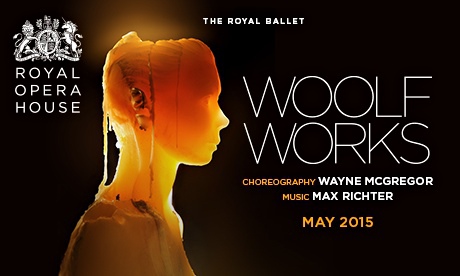Woolf Works, a brand new production conceived out of the works of 20th century novelist Virginia Woolf, received an outstanding roar of applause and standing ovations at its premier last night. The Royal Ballet’s own resident contemporary choreographer, Wayne McGregor was inspired to fulfil Woolf’s dream of combining her stylistic prose which defied the writing rules of her era with the transformative and emotional powers of dance. McGregor worked tirelessly with Uzma Hameed as the production’s dramaturg to unravel ‘the luminosity, sonorousness and poignancy of [Woolf’s] world.’
With
an array of the best principal dancers from the Royal Ballet including Natalia
Osipova, Federico Bonelli, Edward Watson and former ballet principal Alessandra
Ferri (now aged 52, can you believe?), Woolf Works brings together the flair and
multiple perspectives of the author’s non-linear writing through three of her
best loved novels – Mrs Dalloway, Orlando and The Waves.
Acclaimed
British composer Max Richter, who previously collaborated with McGregor on his
other ballets, including Infra and Kairos, revealed the delicate tinges of Woolf’s
moving works through simple melodies, orchestral influences from minimalist
composers, such as Philip Glass and Steve Reich, with structured fusion of
electronic and industrial music. Taking turns with Richter’s pre-recording
sonic music was the Royal Opera House’s orchestra who were conducted by Koen Kessels with craft and
subtlety; as of the start of the 2015/16 season he shall be the new Royal Ballet's music director.
I Now, I Then covers the tale of Mrs
Dalloway, which is delicately handled by Ferri. Ciguë and We not I, the stage designers
for the entire triptych, have large human-size photo frames rotating for the principals
to dance around and stand inside with projections of London and the countryside
from Clarrisa’s past. As the frames rotate, one by one the characters flow in just as
they had entered Clarrisa’s life in the book. Her puzzling choice of lovers
from Sally Seton, which is captured in a kiss shared with British rising star Francesca
Hayward, to her first meeting with her husband, Richard Dalloway danced by Bonelli who
enraptures her in his arms. The heart-felt trauma characterised in WWI sufferer Septimus
Warren Smith is set on fire by the soaring jumps and intensely courageous performances
by Edward Watson. Here, the audience get the most out of the Royal Opera House’s
orchestra through gripping strings that are tied down to the
rhythms of a ticking clock.
Orlando
is a renowned satirical feminist classic, which is shown through the piece Becomings. Male
principal dancers are dressed in Moritz Junge's tutus and metallic costumes’ cut from the Elizabethan period. The stage is bare but the dancers have Lucy Carter’s beaming
strobe and laser lights shinning above them that turn the Royal Opera House
into a nightclub scene, however, Richter’s electronic music is more subversive,
slow and reflective of Woolf’s emotive piece. A mesmerizing sight is also shown through a seductive pas
de deux that looked as if it had been dragged out of an Alexander McQueen fashion
show.
Orlando
is a tale about a nobleman who wakes up to find that he has changed into a woman. To abstractly depict this Osipova provides a dazzling solo that grows into eclectic group
choreographies with Akane Takada, Melissa Hamilton and Sarah Lamb providing
androgynous vibrancy with Steven McRae, Tristan Dyer, Eric Underwood, Matthew
Ball, Gary Avis and Watson presenting feminine foot steps and gestures to
relive the attributes of the metamorphosed nobleman. The climactic finale is
also a thrill with all the dancers assembled into three separate circles and
Richter’s score sky rocketing.
The
last piece is the shape-shifting Tuesday
from the book The Waves that commences with a letter by Woolf read by actress
Gillian Anderson. With a video clip of the sea and its waves, audiences watch
as children revive our memories of youth as the dancers intertwine and lock
together conveying the rich diversity of life. It ends with
Ferri supported tenderly by Bonelli who carries her until she lies on the
ground signifying the end.
Three
carefully created pieces pull together Woolf’s inner consciousness and convey
them in dissimilar ways through Richter’s immersive score and McGregor’s daring
contemporary style. This is a sensational piece of modern dance that shouldn’t
be missed. Don’t waste a moment. Go grab a ticket while you can.
Photos courtesy of @The Stage. Production ends on May 26th. Click here for more details.
#ROHwoolf Ooh, this one for luck. 5-star performance.Don't waste a moment.Go get a ticket before it ends.Sensational! pic.twitter.com/CAxKpY5vup
— Mary Grace Nguyen (@MaryGNguyen) May 11, 2015
Curtain call #ROHwoolf Principal dancers,creative team,ROH orchestra @WayneMcGregor &even Woolf deserve the applause pic.twitter.com/ARKhnH0Ti9
— Mary Grace Nguyen (@MaryGNguyen) May 11, 2015
#ROHwoolf BECOMINGS from Virginia Wolf's Orlando was hands down sensational. From costumes, group choreographies, piano solo & laser beams.
— Mary Grace Nguyen (@MaryGNguyen) May 11, 2015
Edward Watson as Septimus in I Now, I Then was quite emotional. Soaring jumps and gracious footwork. I might have wept a tear #ROHwoolf
— Mary Grace Nguyen (@MaryGNguyen) May 11, 2015












